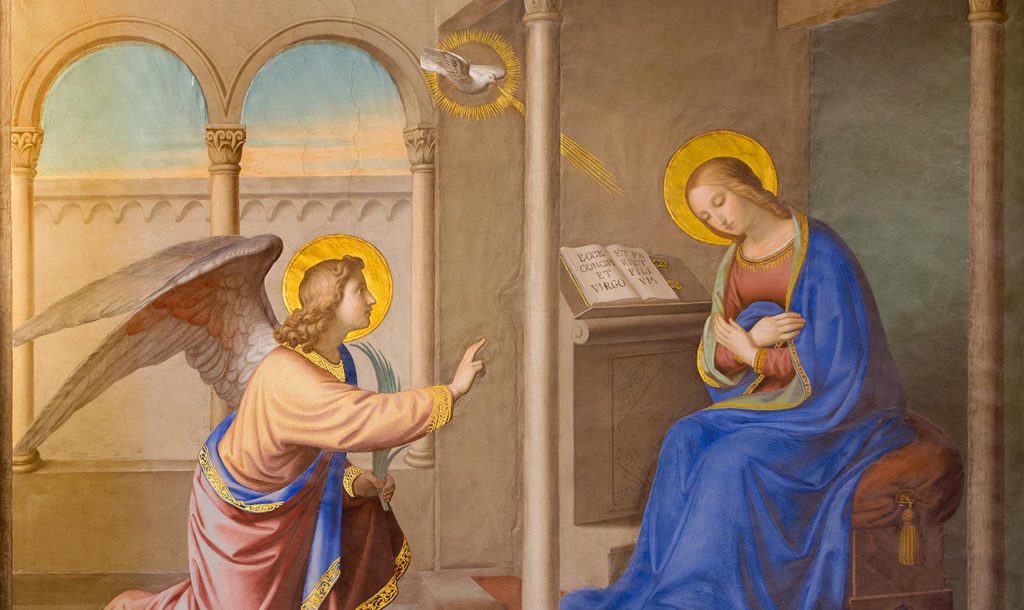Click to Read Luke 1:26–38
- Sensationalism sells
- This is very much evident in the media.
- Even if a controversy does not exist
- Headlines allude to one… so their product and services can sell.
- We may try to ascribe such a scenario to this passage, with intent to gloss over and hide (alleged) inappropriateness of Jesus’ birth.
- But we need to look at Jesus’ Birth Narrative’s presentation here from the view of Jesus’ Passion, Death and Resurrection.
- Luke (and Matthew) are simply reporting that Jesus did not have a father in the ordinary way, and that this was because Mary had been given special grace to be the mother of God’s incarnate self.
- Scientists will say that virgin birth is in theory possible
- (it sometimes happens in small animals, e.g. lizards),
- and that a child thus produced would be a complete human being.
- The problem is that, always supposing such a thing were possible,
- the child would naturally be female.
- The truly remarkable thing from the scientific point of view is
- that Jesus was male.
- Luke explains through the words of the angel a double explanation for the whole event.
- The Holy Spirit will come upon Mary
- enabling her (as the Spirit always does)
- to do and be more than she could by herself.
- But at the same time ‘the power of the Most High’
- will overshadow her.
- This is something different:
- God himself, the creator, will surround her completely with his sovereign power.
- The Holy Spirit will come upon Mary
- God does intervene in and through Mary
- But not like a pagan god intervening roughly and inappropriately in the affairs of mortals,
- But appropriately like the creatures he created in his own image
- And respected them fully by giving them freedom, self-determination and free will
- When he takes the initiative, it is always a matter of love,
- love which will care for us and take us up into his saving purposes.
- Mary is, to that extent, the supreme example of what always happens
- when God is at work by grace through human beings.
- God’s power from outside, and the indwelling spirit within,
- together result in things being done which would have been unthinkable any other way.
- For Luke, Matthew and even Paul, this story is not at all out of place
- Or even appears doubtful
- Their faith does not start with the birth
- For them it begins with Jesus’ death and Resurrection
- So when they look at Jesus’ birth in hindsight,
- It is only the truth for them…
- Or even appears doubtful
- Luke’s primary purpose in crafting this section is political or royal meaning Luke gives to the whole event.
- The child to be born will be the Messiah,
- the king of the house of David.
- God had promised David a descendant who would reign for ever—
- not over Israel only, but also the whole world.
- And this coming king would be, in some sense, ‘God’s son’ (2 Samuel 7:14; Psalm 2:7; Psalm 89:27).
- As with a good deal of New Testament language about Jesus,
- this is both a huge theological claim
- (Jesus is somehow identified with God in a unique way
- which people then and now find it hard to grasp and believe)
- and a huge political claim
- (Jesus is the true ruler of the world
- in a way which leaves Caesar, and the powers of the world today,
- a long way behind).
- Luke will go on to tie and culminate in Acts of the Apostles…
- Where he proclaims Jesus is the King among us…
- A resonance of Jesus’ Incarnation, which he is describing here…
- The child to be born will be the Messiah,
- Put all this together—
-
- the conception of a baby,
- the power of God, and
- the challenge to all human empires—
- and we can see why the story is so explosive.
- Perhaps that’s one reason why it’s so controversial.
- Perhaps we are afraid of the demands this puts on us.
- And we may be afraid to give in to these demands.
-
- The story seeks to underline this demand….
- Zechariah before this episode… responds with unbelief
- Mary seeks more information to a scenario described to her
- And which She knows nothing about
- The Angel does not give her a guide book
- Only assurance
- “It is God who will work in and through her”
- This is the promise for you and me…
- Do not respond with unbelief
- God will form you and transform you
- And you like Mary will be call blessed.
- Do not harden your hearts today…
- Respond to him with an open and desirous heart
- For Jesus to be part and center of your life.




